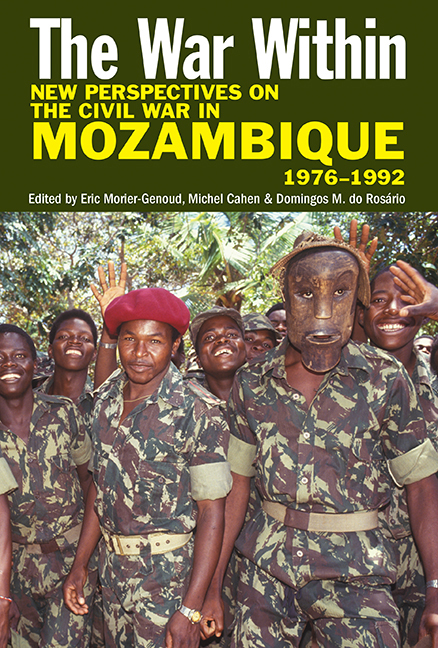Book contents
- Frontmatter
- Contents
- List of Illustrations
- Contributors
- List of Abbreviations
- Introduction The Civil War in Mozambique: A history still to be written
- Part I In the Northern Heart of the Civil War
- 1 The Anti-Frelimo Movements & the War in Zambezia
- 2 War to Enforce a Political Project?: Renamo in Nampula Province, 1983−1992
- 3 Spiritual Power & the Dynamics of War in the Provinces of Nampula & Zambezia
- 4 The War as Seen by Renamo: Guerrilla politics & the ‘move to the North’ at the time of the Nkomati Accord, 1983−1985
- Part II In the South Another Kind of War?
- Part III Inside Out: New Perspectives & The World-System
- Conclusion New Perspectives on the Civil War in Mozambique
- Towards a Bibliography of the Mozambican Civil War
- Index
2 - War to Enforce a Political Project?: Renamo in Nampula Province, 1983−1992
from Part I - In the Northern Heart of the Civil War
Published online by Cambridge University Press: 27 July 2018
- Frontmatter
- Contents
- List of Illustrations
- Contributors
- List of Abbreviations
- Introduction The Civil War in Mozambique: A history still to be written
- Part I In the Northern Heart of the Civil War
- 1 The Anti-Frelimo Movements & the War in Zambezia
- 2 War to Enforce a Political Project?: Renamo in Nampula Province, 1983−1992
- 3 Spiritual Power & the Dynamics of War in the Provinces of Nampula & Zambezia
- 4 The War as Seen by Renamo: Guerrilla politics & the ‘move to the North’ at the time of the Nkomati Accord, 1983−1985
- Part II In the South Another Kind of War?
- Part III Inside Out: New Perspectives & The World-System
- Conclusion New Perspectives on the Civil War in Mozambique
- Towards a Bibliography of the Mozambican Civil War
- Index
Summary
The post-colonial war in Mozambique, which lasted two decades, holds a central place in national, regional and international history. Many academic works have associated the war with external factors, thus reducing the guerrilla to a proxy force, to marionettes of destabilization, and a movement without any social base or political project, fighting a non-ideological war, if not just being ‘a cult of violence’. Thus Renamo has eventually come to be perceived internationally as an incarnation of evil, ‘the Khmer Rouge of Africa’, and it has been labelled as a terrorist organization because it was ‘waging a war of terror against innocent Mozambican civilians through forced labour, starvation, physical abuse and wanton killing’. Such interpretation of the nature of Renamo has seriously limited our understanding of the nature and dynamics of the Mozambican armed conflict.
It is the anthropological work of Geffray and Pedersen that prompted a paradigm shift, away from explanations focused on external factors to those focusing on internal factors. Scholars who followed on from their investigations revealed resistance by large sectors of society to the modernizing projects of the Socialist Frelimo regime.
The dynamics of the war in Nampula province have been analysed by Alice Dinerman in 2006. In her book, Dinerman uncovers many dynamics noted by previous authors. However, she continues to argue that the war remained a destabilization campaign from start to finish, not only because using Renamo was Pretoria's main strategy to discipline Frelimo and force it to make the policy changes favourable to the apartheid state, but also because Renamo set about building up the political and administrative wings it had because South Africa's agenda remained unchanged and the rebel leadership never seriously entertained the belief that it could challenge Frelimo's historical place in contemporary Mozambique.
In the year 2000, Graham Harrison offered a more nuanced view. He advanced the interpretation that the war and the method used by the authorities to extract resources from the residents directly and indirectly exacerbated the material crisis in Nampula society and helped Renamo evolve from a small, externally created, rebel group, into a large guerrilla army that eventually controlled entire regions of the country.
- Type
- Chapter
- Information
- The War WithinNew Perspectives on the Civil War in Mozambique 1976–1992, pp. 46 - 74Publisher: Boydell & BrewerPrint publication year: 2018
- 1
- Cited by



